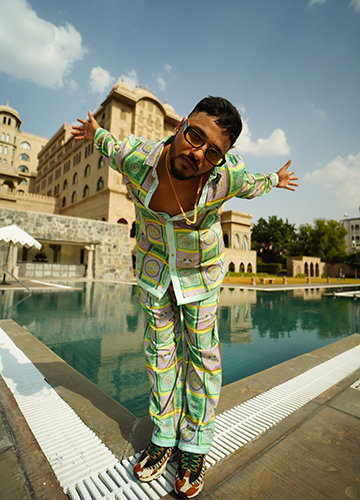The first two lines of rapper Raftaar’s latest track, ‘GOAT Dekho’ (released on November 30) goes: Lo aya asli gangster back. Lo suno jisney suna nahi gangster rap. (The real gangster is back. Here, listen, those who have not heard gangster rap.) This could have been confusing to Indian listeners a few years back. Is he confessing that he is a criminal, at least some may have wondered.
But, over the last decade or so, hip-hop culture has spread rapidly in India and the native rap audience now knows that G (gangster/gangsta) and OG (original gangster) have been adopted for use outside the gang culture and have become positive appellations in hip-hop. So, an OG is a senior hip-hop artist. Raftaar, 33, an OG on the Indian scene, believes that hip-hop has evolved fast in India as compared with the west. “If you look at the new ads and jingles, movie music and independent music, there is so much hip-hop,” he says. “All these clothing lines, sneakers, the demand is through the roof. It is because of the hip-hop culture, because it includes the sneaker-culture.”
Raftaar was born as Dilin Nair to a Delhi-based Malayali couple. His stage name, meaning speed, is based on the pace and flow of his rapping. He started his rap career in the late 2000s, when the genre was finding its feet in India. In the early 2010s, he started working with Punjabi band RDB and, in 2013, he released his debut mixtape, WTF (witness the future). His 2014-song ‘Swag Mera Desi’ with Manj Musik (Manjeet Singh Ral, formerly of RDB) won the Brit Asia TV Music Award for the best urban single.
Raftaar made his Bollywood debut with the Saif Ali Khan-starrer Bullet Raja (2013). He says he has worked selectively in Bollywood (around 20 credits as singer, lyricist, or both, till the 2021-Vidya Balan-starrer Sherni) and loves the work he has done. ‘Dhakaad’, Dangal (2016), ‘Mantoiyat’, Manto (2018) and the title track for Andhadhun (2018) are his favourites. And he is proud of his work with A.R. Rahman and Arijit Singh. Raftaar has also churned out hits for multiple corporate music labels.
But, his most important work, arguably, is what he does with his independent music and his label Kalamkaar (a portmanteau of kalam, meaning pen, and kalakaar, meaning artist). These are the tracks which are generally lyrically stronger, and typically, less popular. “When I do independent music, whatever happens, I am going to promote songs with the right lyrics,” he says. “My money is invested into the kind of music I believe in.”
However, rap has, at times, promoted the wrong ideas, too, like misogyny. Raftaar has also made mistakes. He does not shy away from admitting them. “There are things I do regret,” he says. “But, I did my wrongs at the right time. Every mistake I made was at the beginning of my career.” He says that he can try to mend his mistakes for the rest of his career. He adds that we, as a society, have always had a problem with admitting our faults. “Whatever artists are saying in their songs, even if it is a party number and they are saying some random things, that is definitely happening in society,” he says. “That is the bitter pill nobody wants to swallow.” However, he also says that it is the duty of artists to make sure their content changes mindsets.
His “bitter pill” argument rings true when you consider that lyrically limited ‘party songs’, the videos of which, more often than not, stereotype or objectify women, are the biggest hits in India. “[After the mistakes earlier,] I have done everything possible to keep the lyrics, the videos and the mindset clean,” he says. “I have tried to give the right messages.” This has also been a general trend in Indian rap; meaningful work is emerging more frequently as the genre evolves.
One of Raftaar’s earliest raps with a message was ‘Mother Nature’, released in 2014, soon after ‘Swag Mera Desi’. The song, which calls out inaction in the face of the climate crisis, has over 7.61 lakh views on YouTube. In comparison, ‘Swag Mera Desi’ has over 4.46 crore. His most popular commercial tracks have more than 20 crore views on the platform and his most popular independent song—the diss track ‘Sheikh Chilli’—has over 12 crore.
Does the disparity frustrate him? “No, never,” he says. “If a song like ‘Mother Nature’ provokes thought, that was the job. If not, you move on.” Such songs, he adds, you listen to only once, whereas pop music plays at weddings, in cars, clubs and on radio. “There are so many others attempting the same (songs with messages) and everybody is reaching a different mass,” he says. “So, everybody together still does the job.”
Raftaar has reiterated the need for togetherness multiple times. His willingness to promote young talent has been widely recognised and appreciated. “I want artists who dedicate their lives to rap being fed by it,” he says. “I want every rapper to have food on his or her table.”
‘GOAT Dekho’, which is a part of his Bar’ish EP (extended play), is about fighting negativity, he says. His fans say that he is the GOAT (greatest of all time) in the Indian rap scene. What does he feel about it? Firstly, he says that for him, it is not greatest, but ‘greatests’, because there are people who have reached the same level of greatness. “Like, if Nas is a GOAT, so is 2Pac,” he says.
“That is the fight; where we are walking towards,” he adds. “There is G, then OG, the next step is being a GOAT. And GOAT is a title that people give you. I have seen a lot of people write that for me. That is when I made the song. I would have never started calling myself a GOAT.”


